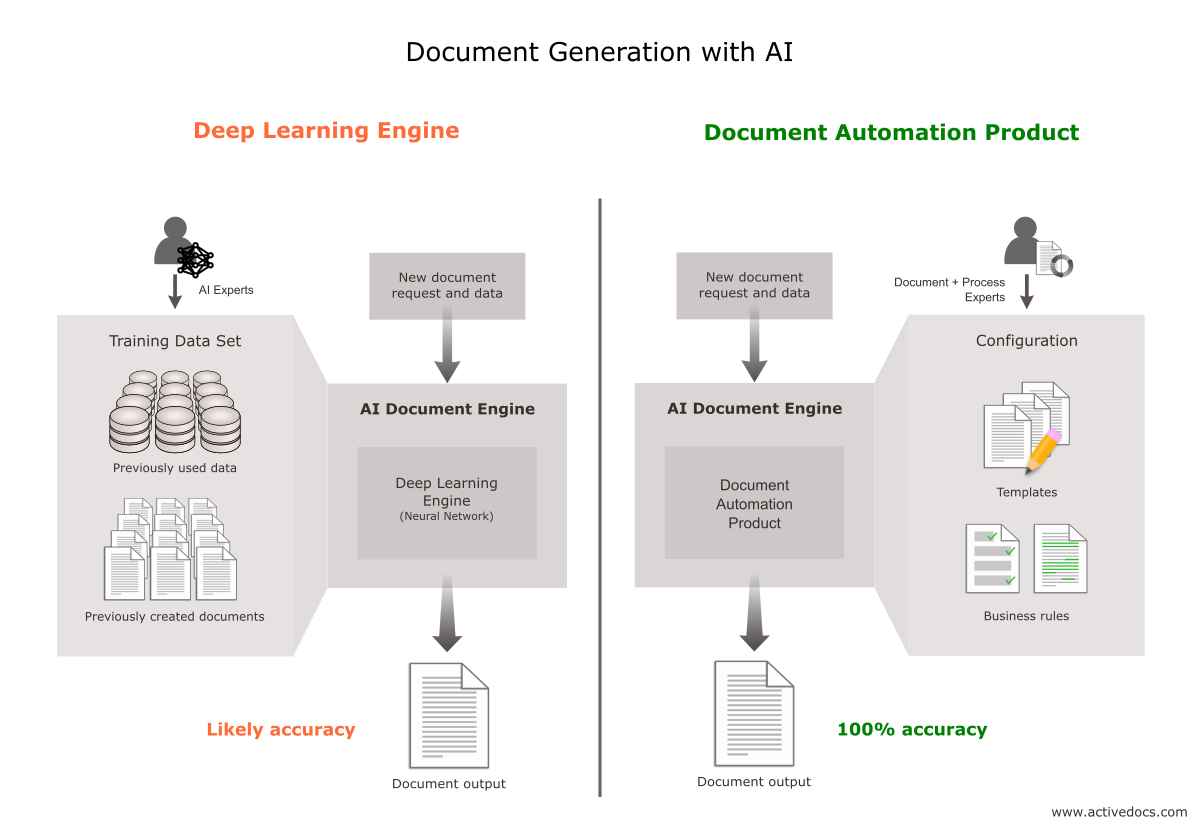Document automation inherently replaces the work of humans, and does it better and faster; this is by many accounts the definition of AI (Artificial Intelligence). So why hasn’t anyone claimed that their document automation product is AI? In fact, there have been attempts to relate document automation to AI by other vendors.
Everything AI-related so far sits in the domain of data extraction for contract or, more broadly, document, management rather than production (supposedly the core function of document automation).
You may argue that there is currently no AI in document automation. You are right if you equate AI with deep learning machines based on neural networks.
Deep learning machines work by being trained on samples of data that represent the set of cases that have been accounted for (supervised learning).
You might conceivably take a set of documents generated over the last few years, feed them and the data that was used to generate them – if still available – into a really well designed deep learning machine that was created to understand documents. Then you may get an AI machine capable of producing some kind of document.
There are certain prerequisites: you need to be confident that the documents used for training are accurate, that they cover all business scenarios, and that all such scenarios are represented sufficiently. At the end of the process, you may get a deep learning machine that can produce one type of document with a high likelihood of the output being accurate.

Comparing AI Document Engines based on deep learning and document automation prouducts in terms of accuracy and configuration.
If a high likelihood of accurate output is the desired outcome – and you don’t mind spending big bucks developing the deep learning machine for documents (someone will try building it sooner or later) – then great.
Most organisations attempt to get as close as possible to certainty of document accuracy. For better or worse, even the most basic fit-for-purpose document automation product will give you 100% certainty that your document is produced exactly the way you designed it, given the data you supply.
“Even the most basic fit-for-purpose document automation product will give you 100% certainty that your document is produced exactly the way you designed it.”
Introducing deep learning into document production creates an additional level of uncertainty. Deep learning engines, and the logic they learn or derive, are typically difficult to understand. You may consider building in some hard and fast rules, for sure, but what is the deep learning neural network doing then?
Deep learning is no doubt very valuable in many areas that interface with document generation. Extraction of data from legacy documents, analysing data and triggering actions based on the understanding of data (e.g. fraud detection, or any other exception detection where there is a large enough sample of data to analyse and train on) and many others.
Deep learning aside, if you need document generation done better than humans on their own can do, you should consider document automation as your AI. You will need to spend time capturing knowledge associated with document generation from your organisation, from the brains of humans, and translating it into your document automation product. As a result, you’ll have built your own AI Document Engine combining your document automation product and the knowledge of document creation that your organisation has always had.
Until AI is capable of connecting to human brains directly to extract the knowledge it needs to generate documents (in this instance) or to rule the world (in another), then document automation products will keep providing more effective ways of producing documents.
If you want to know more about building AI document engines based on document automation products, you can check out our white paper where we cover this topic more in-depth.

Martin Srubar
Senior Technology Evangelist
Martin’s engineering background and his passion for great products whether in physical or software form are complemented by his understanding of ActiveDocs applications and how they meet the requirements and fit the architecture of the company’s clients. Martin continues to engage with potential and existing customers, adding market intelligence and customer feedback into the company’s ongoing product development strategy.